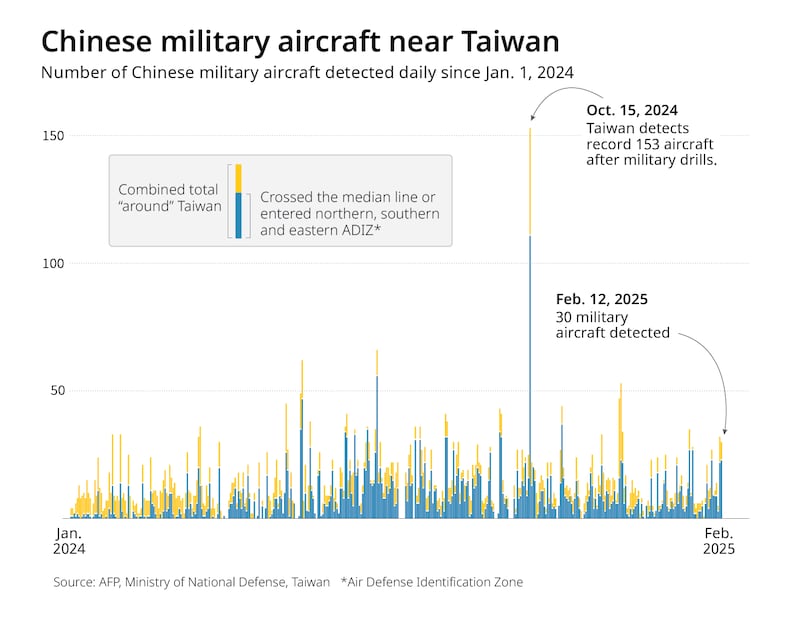UPDATED at 11:16 A.M. ET on 02-18-2025
TAIPEI, Taiwan – Taiwan is in the process of negotiating a new arms deal worth billions of dollars with the United States, Reuters news agency reported, citing unidentified sources.
Meanwhile, the top U.S. military commander in the Indo-Pacific, Adm. Samuel Paparo, has warned that Chinese military drills around Taiwan were actually “rehearsals” for an attack on the island.
Three sources familiar with the situation, who wished to stay anonymous due to the sensitivity of the topic, told Reuters that Taipei was “in talks with Washington” about an arms purchase worth between US$7 billion and US$10 billion, and that the package could include coastal defense cruise missiles and high mobility artillery rocket systems, or HIMARS.
Taiwan’s ministry of defense declined to confirm the news but said Taipei was committed to strengthening national defense.
Defense ministry spokesperson Sun Li-fang told reporters in Taipei that all defense budgets follow government policy and that plans would be disclosed to the public when they had been finalized.
There was no confirmation from Washington either.
Su Tzu-yun, research fellow at the state-backed Institute for National Defense Security Research, said that while he can’t confirm the purchase, it seems to reflect “Taiwan’s own needs to improve its defense capabilities.”
“The weapons backlog is global, including the delayed delivery of F-35s to Japan,” Su told RFA, adding that in his opinion “it won’t be too much of a problem considering the reorganization of defense industries in democratic countries.”
There remains still a large backlog of arms sales from the U.S. to Taiwan. According to the Cato Institute think tank, the backlog is valued at US$21.95 billion, mostly of traditional weapons such as tanks and aircraft.
At the annual Munich Security Conference on Saturday, U.S. Secretary of State Marco Rubio, Japan Foreign Minister Takeshi Iwaya and South Korea Foreign Minister Cho Tae-yul “emphasized the importance of maintaining peace and stability across the Taiwan Strait as an indispensable element of security and prosperity for the international community,” they said in a joint statement.
They said their countries supported Taiwan’s “meaningful participation” in appropriate international organizations, and encouraged the peaceful resolution of cross-Strait issues, and “opposed any attempts to unilaterally force or coerce changes to the status quo.”
RELATED STORIES
China condemns US ships in Taiwan transit, conducts drills
Taiwan to scale up annual military drill as China tensions mount
China rehearses attacks
The top commander of the U.S. Indo-Pacific Command warned at a security forum in Hawaii last week that China’s increased military activity around Taiwan were not exercises but “rehearsals for the forced unification of Taiwan to the mainland.”
“We’re very close to that [point] where on a daily basis the fig leaf of an exercise could very well hide operational warning,” Adm. Samuel Paparo said.

The Chinese People’s Liberation Army, or PLA, has been conducting regular military drills around Taiwan, especially at the times of heightened tensions on the island such as major political events or during visits by senior U.S. officials.
Between Jan. 28 and Feb. 12, the PLA’s Eastern Theater Command held so-called combat patrols with aircraft and warships around Taiwan, the same time as U.S. Navy destroyer USS Ralph Johnson and oceanographic survey ship USNS Bowditch made a north-to-south passage through the Taiwan Strait.
Paparo said that the U.S. must move quickly to close military capability gaps with China.
“Our magazines run low. Our maintenance backlogs grow longer each month ... We operate on increasingly thin margins for error,” he said, calling for reforms of the Pentagon’s procurement system.
The Taiwanese ministry of national defense, meanwhile, stated that the island’s army “will continue to work hard to build up the army and prepare for war, and enhance asymmetric deterrence capabilities.”
The ministry said in a statement to the media that it would “use joint intelligence, surveillance and reconnaissance methods to closely monitor the dynamics of the sea and airspace around the Taiwan Strait, and dispatch appropriate troops to respond, and have the ability, determination and confidence to ensure national defense security.”
Edited by Mike Firn.
This story has been updated to include comments by Su Tzu-yun of the Institute for National Security Defense Security Research.
